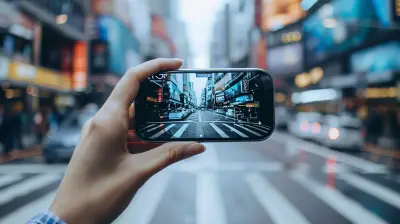The Future of Flexible Displays: More Than Just Foldable Phones
6 November 2025
Technology never stands still, and when it comes to displays, we’re witnessing some seriously mind-blowing innovations. Foldable phones might have stolen the spotlight in recent years, but flexible displays are just getting started. Imagine rolling up your tablet like a newspaper, wearing a screen on your wrist that’s as thin as paper, or having interactive, shape-shifting surfaces all around you. Sounds like sci-fi? Well, the future says otherwise.
Let’s dive deep into the world of flexible displays and see why they’re about to change way more than just smartphones.

What Are Flexible Displays, Anyway?
Before we talk about what’s coming, let’s get the basics out of the way. Flexible displays are screens that can bend, fold, roll, or stretch without breaking. Unlike traditional rigid screens made of glass, these displays use materials like organic light-emitting diodes (OLEDs) or microLEDs on plastic, metal, or flexible glass substrates.The result? Ultra-thin, lightweight, and durable screens that can morph into new shapes and serve in ways we’ve never seen before.

Beyond Foldable Phones: Where Else Will We See Flexible Displays?
Okay, foldable phones are cool, but they’re just the tip of the iceberg. Here’s where flexible displays are headed:1. Rollable and Expandable Tablets & Laptops
Ever wished your laptop screen could just stretch out when you need more space? Companies like Samsung, LG, and Lenovo are already working on rollable and expandable screens that can transform on demand.Imagine a tablet that starts off small, but with a gentle pull, extends into a widescreen display for productivity or gaming. That means no need to carry bulky devices—just one compact gadget that adapts to your needs in real time.
2. Wearable Tech: Smart Clothing and Accessories
Smartwatches are cool, but what if your entire jacket or armband could display notifications, health metrics, or even live sports scores?Flexible OLED and e-paper displays are making it possible to integrate screens into clothes and accessories without adding bulk. This could revolutionize wearable health monitors, fashion, and even sports gear with real-time performance tracking.
3. Automotive Displays: Curved Dashboards & Smart Windows
Cars are becoming smarter, and flexible displays are playing a huge role. Instead of traditional screens, car manufacturers are working on wraparound dashboards that seamlessly blend into the vehicle’s interior.We’re talking about:
- Curved instrument clusters that adjust based on driving conditions
- Transparent smart windows that display navigation or entertainment
- Interactive surfaces that replace buttons and knobs for a minimalist, futuristic look
4. Foldable and Rollable TVs
Who needs a bulky TV stand when you can roll up your 75-inch TV like a poster and tuck it away? LG has already introduced rollable OLED TVs, and we’re only getting started.In the near future, we could see paper-thin, wall-sticking displays or projectors embedded within flexible screens, turning any surface into an entertainment hub.
5. Smart Homes with Interactive Surfaces
What if your kitchen counter, mirror, or even fridge door could double as a touchscreen? Flexible displays could transform everyday surfaces into smart control panels, giving you access to information, entertainment, or even recipes without needing a physical device.A mirror that displays your daily schedule? A desk that acts as a screen for video calls and notes? The possibilities are endless.

What’s Powering This Revolution?
Flexible displays wouldn’t be possible without some serious advancements in tech. Here’s what’s making them a reality:1. OLED and MicroLED Breakthroughs
Unlike traditional LCDs, OLEDs (Organic Light-Emitting Diodes) don’t need a backlight, which allows them to be thin, flexible, and even foldable. In the next few years, MicroLED technology will likely take things even further with brighter, more energy-efficient, and longer-lasting displays.2. Graphene and Nanomaterials
Graphene is a futuristic material that’s only one atom thick, yet stronger than steel and more flexible than anything we’ve ever seen. Researchers are working on integrating graphene into flexible screens to make them even tougher and more adaptable.3. E-Paper and Low-Power Displays
E-paper displays, like those used in e-readers, are evolving too. Future versions could offer color, animation, and real-time refresh rates without sucking up battery life—perfect for wearables and smart surfaces.4. Folding Glass Innovations
One of the biggest challenges for foldable devices was finding a material that bends while staying scratch-resistant and durable. Companies are developing ultra-thin bendable glass that mimics plastic’s flexibility but retains glass-like toughness.
Challenges and Roadblocks
Of course, not everything is smooth sailing. There are still some bumps in the road before flexible displays become mainstream:- Durability Concerns – Creases or wear-and-tear could reduce long-term usability.
- High Costs – Early flexible devices have been expensive, but mass production should drive prices down.
- Battery Life – Powering these advanced screens while keeping energy-efficient remains a challenge.
What’s Next? The Future of Flexible Displays
The next decade is going to be an exciting time for display technology. Here’s what we might see:- Stretchable Displays – Screens that expand and contract without distortion.
- Shape-Shifting Gadgets – Devices that morph into different forms depending on usage.
- Holographic and 3D Displays – Interactive screens that don’t even need physical surfaces.
- Augmented Reality Integration – Seamless blending of smart displays with real-world environments.
As researchers push the boundaries, flexible displays will go far beyond cool-looking gadgets; they’ll become part of our everyday lives.
Final Thoughts
We’re on the brink of a display revolution. Flexible screens won’t just change our phones—they’ll transform how we interact with the world. From wearables and cars to entire smart homes and beyond, the possibilities are endless.So, are you ready for a future where screens are everywhere, seamlessly blending into our surroundings? Because it’s coming sooner than you think.
all images in this post were generated using AI tools
Category:
Tech TrendsAuthor:

Reese McQuillan
Discussion
rate this article
1 comments
Maggie McCray
Great insights on flexible displays! It's exciting to think about their potential beyond phones—transforming our everyday interactions with technology.
November 7, 2025 at 11:42 AM

Reese McQuillan
Thank you! I completely agree—flexible displays hold immense potential for transforming not just phones, but a wide range of everyday technology. Exciting times ahead!


